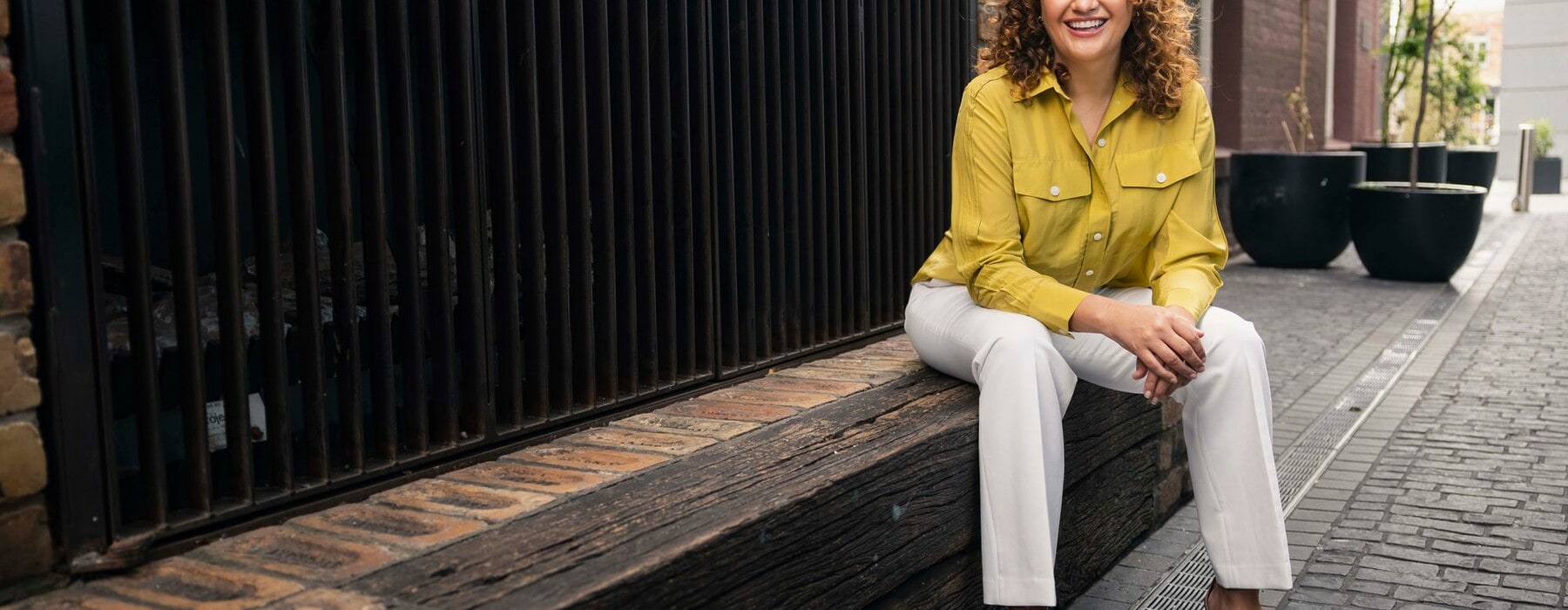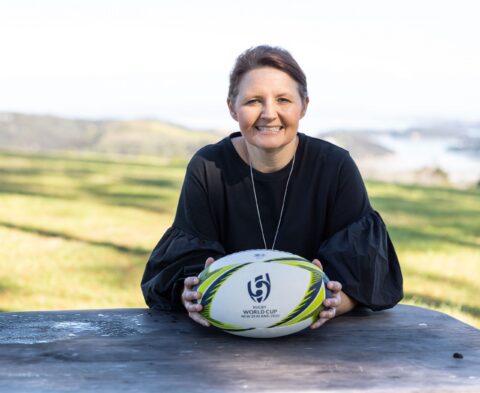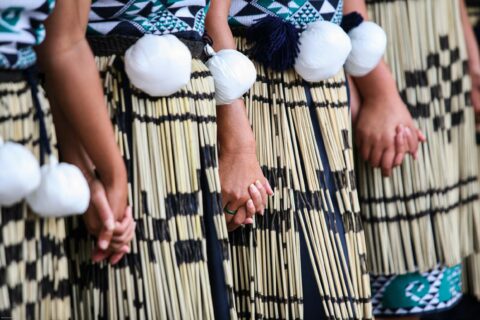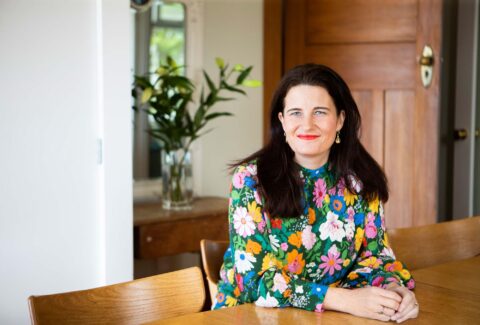When it comes to winning, Melodie Robinson means business. The sports-obsessed journalist talks equality, kids and kicking goals with Nicky Pellegrino.
The first thing you notice about Melodie Robinson is her warmth. She’s a hugger, quick to laugh, sparkly eyed and always ready with a wry, self-deprecating joke.
Still, you don’t need to dig very deep to find the steel beneath that. This is a woman who, as a Black Fern, was known for her aggression and speed, who since her retirement from rugby has made a career from storming into a man’s world and doing her best to reshape it. Melodie is a lot of fun, but when something matters to her, she doesn’t mess about.
And sport matters to Melodie. It matters a lot. Today she has a top job as TVNZ’s general manager of sport and events, responsible for coverage of the Olympics, the America’s Cup and any other global sporting contest you care to mention. Sport has been a driving force since she was a kid. So why is it so important to her?
“Because it changes people’s lives,” explains Melodie. “It makes you understand goals, shows you what working as a team is, and gives you experiences you might not have if you don’t come from a life of privilege. Also, it makes lifelong friends. I love sports because of all those things.”
Sport makes you understand goals, shows you what working as a team is, and gives you experiences you might not have if you don’t come from a life of privilege

There doesn’t seem to be a corner of her life that hasn’t been coloured by her passion. She is even married to a sportsman, Marcus Wheelhouse, a golf pro turned coach.
“We met the traditional romantic Kiwi way, at a party after an All Blacks test,” Melodie recalls with a smile. “We struck up a conversation, talked all night, then he came back to my house with me and my friends and never quite left. I was 34, thought I was on the shelf and was fine with that. Then out of nowhere I met this guy who I thought was amazing. We had our babies very quickly.”
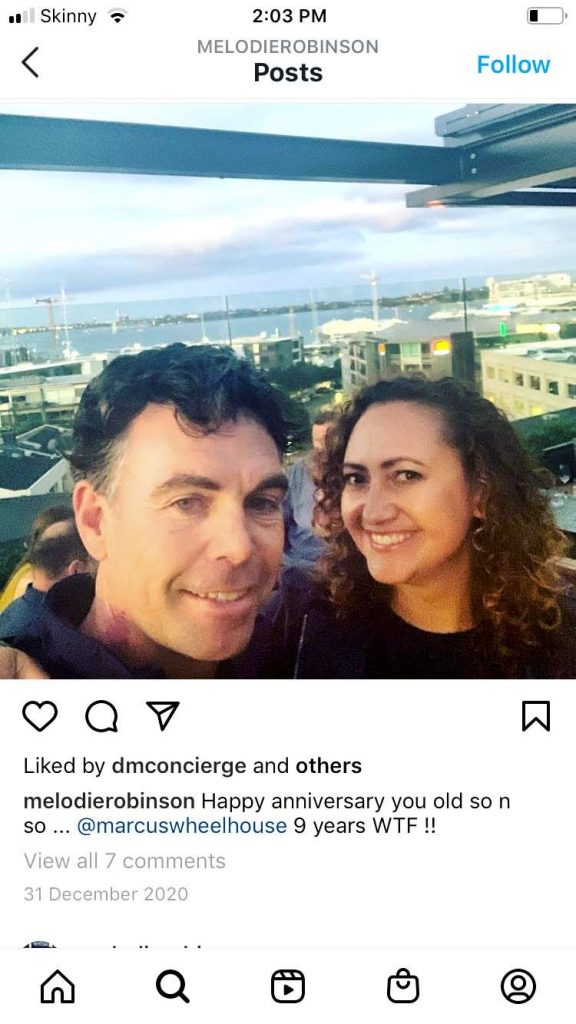
PHOTO VIA MELODIE ROBINSON INSTAGRAM
Sons Jensen, 11, and Freddie, 10, along with her husband and the German shepherd dog Melodie got during the first lockdown, are the world she retreats to when working life gets stressful. Her job is challenging, particularly at the moment with the global pandemic changing the sporting landscape day by day, and media outlets like TVNZ having to adapt as the situation demands.
Organising the coverage of both the Tokyo Olympics (July 23 until August 8 on TVNZ 1) and Paralympics (August 25 until September 5 on TVNZ Duke) under this cloud of uncertainty has been a major challenge.
“It’s been pretty crazy,” Melodie says, explaining that ensuring the health and safety of journalists and camera operators going to Tokyo has been a huge undertaking. “It’ll be an Olympics like no other, but that’s also what’s going to make it special.”
Melodie is no stranger to waking up at 3am, heart pounding with anxiety at the thought she may have forgotten something important. “I did exactly that last night,” she admits.
Her coping strategy, aside from newly introduced workplace mindfulness sessions, tends to be family time. “I love to be social, but I do shut myself off a lot on the weekends or holidays. I’ll have a glass of wine with my husband and talk things through. We’re best mates, so it’s really helpful. I can tell him stuff I don’t tell anyone else and he does that with me.”
The other sure-fire stress buster is exercise. “I’m a runner, and I don’t put music on. I just think things through, so that’s probably my form of meditation,” she says.
Right now, as she juggles work and family, 48-year-old Melodie – who had the honour of being the first New Zealander to be made into a Barbie doll – isn’t pounding the pavements quite as often as she’d like and doesn’t enjoy the feeling of her body not being in top shape.
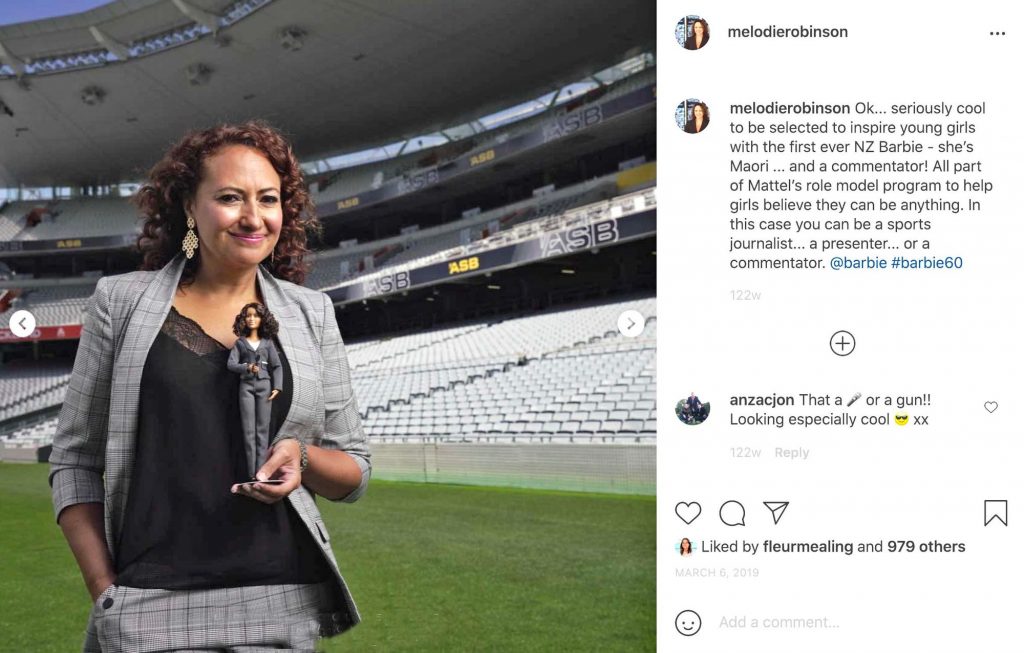
PHOTO VIA MELODIE ROBINSON INSTAGRAM
“The other day I caught a glance of myself in the mirror and my stomach was poking out, so I thought I’d better get out there a bit more often,” she says, ruefully.
Melodie is never tempted to play a game of rugby though, partly because social team sports aren’t such a great fit for someone with a highly developed competitive edge.
“Also, there comes a point when you don’t want to do it anymore,” she explains. “I think a lot of All Blacks would say that as well. It takes a lot of energy, you put your body on the line, you’re smashing people and you’re in a heightened state of focus. The lifespan of that is limited.”
These days, any sport Melodie does play is with her kids – and yes, she still likes to win.
“Jensen is quite good at golf, so I took him on and beat him by one shot. Now I’ve said I’ll never play him again, which means I’m the victor forever,” she smiles. “Recently, I played against him in basketball. He didn’t know it but I played a lot of basketball when I was young, so I absolutely wasted him and he couldn’t believe how good I was.”
Younger son Freddie seems to have his mum’s measure. “We play chess,” says Melodie. “Usually I beat him, but he knows that if I have a glass of wine he can take me down so now he’ll go and get one for me first!”

PHOTO VIA MELODIE ROBINSON INSTAGRAM
When she was a child, rugby was what bonded her with her grandfather and father. She describes her relationship with both of them as amazing, and talks about her dad as a particularly colourful character.
“He was a gang member actually, a Devil’s Henchman for about seven or eight years,” says Melodie. “I would say he did it because he loved motorbikes and also the camaraderie. He was in the Timaru chapter while he was working as a fireman.
“I remember my 16th birthday, the first time I got drunk, I’d gone to the Devil’s Henchmen national convention and Dad was behind the bar pouring me drinks… terrible, really, when you think of it.”
Her father (Ngāi Tahu) is from Little River, near Akaroa. Spending time there with her extended whānau (Stacey Morrison is a cousin), Melodie absorbed a lot of tikanga and these days she’s taking classes to resuscitate her te reo Māori knowledge.
Her mum, who died of cancer in 2014, was a blonde, blue-eyed Pākehā from Christchurch, and split from her father when Melodie was young.
“It was my 13th birthday when Dad came in to tell me,” she recalls. “Miss New Zealand was on the telly and he said, ‘One day you’ll be as beautiful as them’, and then, ‘I’m leaving your mother.’”
Melodie’s brothers went to live with their father, while she and her sister stayed with their mother. “The family legend is that Dad paid Mum $2000 for each of the boys. It may have been true… I wouldn’t put it past my Mum.”
Being pretty independent, the fracturing of her family was something that Melodie coped with fairly well, and she still has a good relationship with her father, who now lives in Australia.
“He’s a great father and very funny. I definitely have the same personality as him. I tend to deflect with humour a lot of the time, and he does that too.”

PHOTO BY REUBEN LOOI
In her teens, Melodie was a rough-and-ready tomboy. Keen to tame her daughter, her mum signed her up to deportment classes at a local modelling agency, which eventually led to Melodie becoming a beauty pageant contestant and winning the title of Miss Canterbury in 1991.
Back then we looked at beauty pageants in a different way, she points out, and lots of girls like her dreamed of wearing a sash and crown. Plus there were benefits to being Miss Canterbury: the prize included $5000 worth of clothes and a trip to Australia for Melodie and her mother.
“Then, while I was in seventh form at Papanui High, I was also working as a model. I earned about $18,000 that year and bought myself a car – sweet as!” she recalls. “But I gave up modelling when I fell in love with rugby in my first year at university. Rugby was far better.”
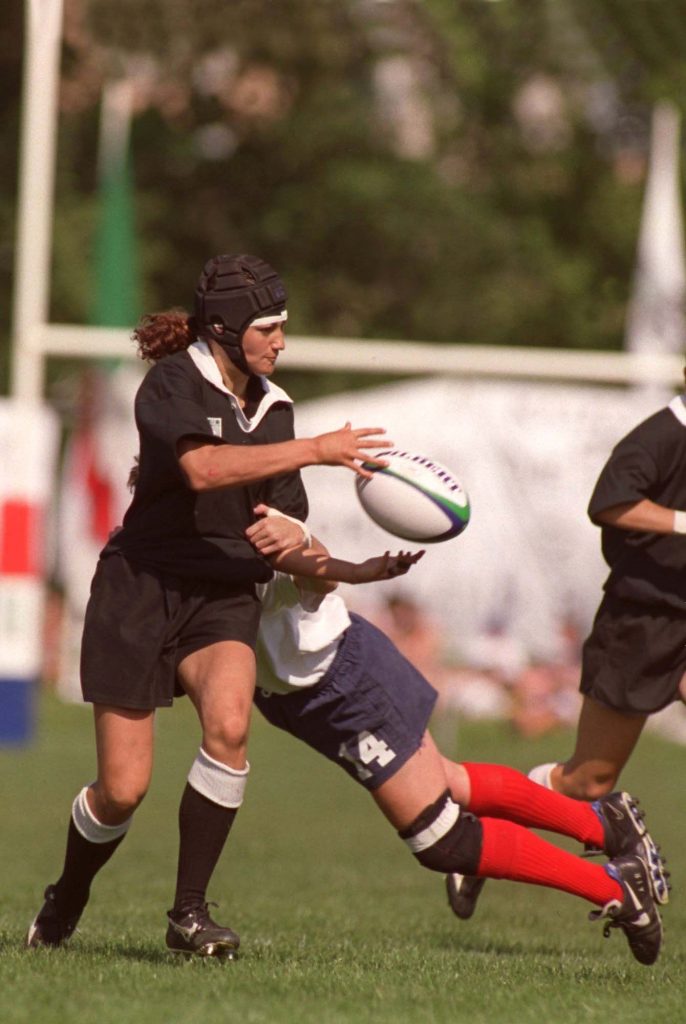
Throughout her career as a rugby player and sports commentator, during her time studying for an MBA at the University of Auckland, and in her corporate jobs since then, a series of mentors have been hugely important to Melodie.
“Mentors are everything, they really are,” she says.
For instance, she has always loved a party (her favourite party tricks are doing the splits or rugby tackling the guys), and credits her Back Ferns coach, Darryl Suasua, with nudging her back into line when she took things too far.
“Darryl knew I was a bit naughty, so he would often ring me and be that parental figure. He did it a lot and it took a while before it sunk in, but eventually it did and I became a better Black Fern because of that.”
A lot of other people have helped her up along the way. From MPs like Georgina te Heuheu and Donna Awatere Huata when Melodie, knowing very little about politics, landed her first job for Mana News based in Parliament’s press gallery, to sports commentator Andrea McVeigh when she got her first job in television.
Now a senior figure in her industry, Melodie’s job has put her the position to help others. In particular she’s striving to encourage more talented women into sports media. She also wants to work towards getting women’s sports the higher profile they need and deserve.
Progress is frustratingly slow and there is a lot that needs to be done, she concedes. Sponsors have a role to play, as well as sports bodies and even mums and dads.
“I think media has a massive role with visibility, putting female sports on television,” says Melodie. “So I’m going to do my bit in the area I work in.”
I think media has a massive role with visibility, putting female sports on television. So I’m going to do my bit in the area I work in
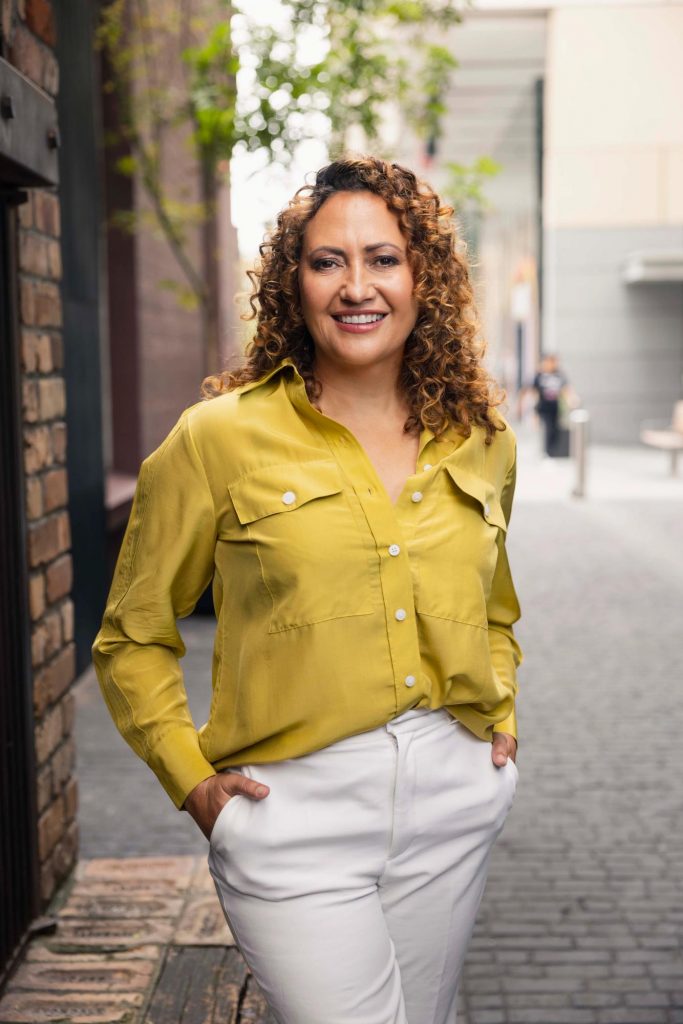
It hasn’t always been easy being a woman in the sports industry, and often it still isn’t. But the determination that made Melodie a power to be reckoned with on the rugby field is now being directed towards changing that.
Sport gave her a doorway to a great life, she says, and now she wants to hold that door open for other females who are looking for the same opportunities.
“Having a positive influence on women’s sport and sports media, that’s awesome. That’s what gets me out of bed in the morning, and that’s why this is my dream job,” she says. “It’s become my passion and my purpose.”

